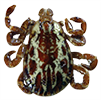Types of Ticks in Niagara and How to Remove
A tick is very small and can range in size from a poppy seed to a small grape (when engorged). They do not jump or fly.
Ticks are normally found in forested areas or areas with long grass, where they attach themselves to humans and animals passing by.
On humans, ticks normally attach to areas such as the groin, armpits, hairline or behind the ears.
Video: How to remove a tick
Types of ticks
- Blacklegged / Deer Tick
-
American Dog Tick
- The most common tick found in the Niagara region
- Does not carry the bacteria that cause Lyme disease
- Usually found in areas with long grass and tree cover
- About the size of an apple seed and reddish brown in colour
- Active in the spring and summer
- Dog ticks usually have white markings or silver-coloured spots
Photos of American Dog Ticks
- Lone Star Tick
- Does not carry the bacteria that cause Lyme disease
- Usually found in areas with long grass and tree cover
- Rarely seen in the Niagara region, but can be transported on migrating birds
- About the size of an apple seed and reddish brown in colour
- Active in the spring and summer
- Female Lone Star ticks have a silvery-white spot or "lone star" on their back while adult males have white spots around their back
Photos of Lone Star Ticks
Comparing tick sizes
Ticks are very small and hard to see. See the size comparison images.















